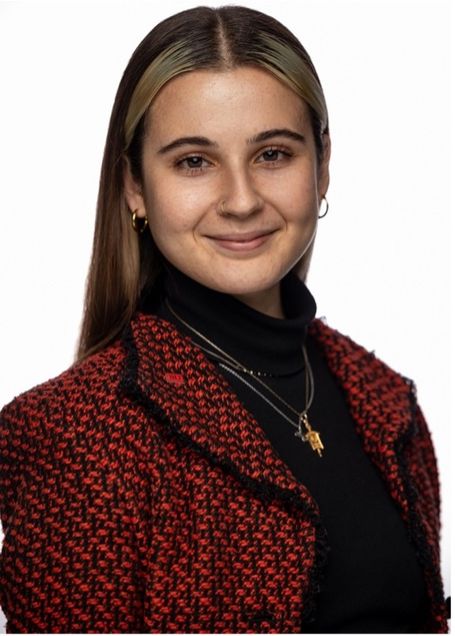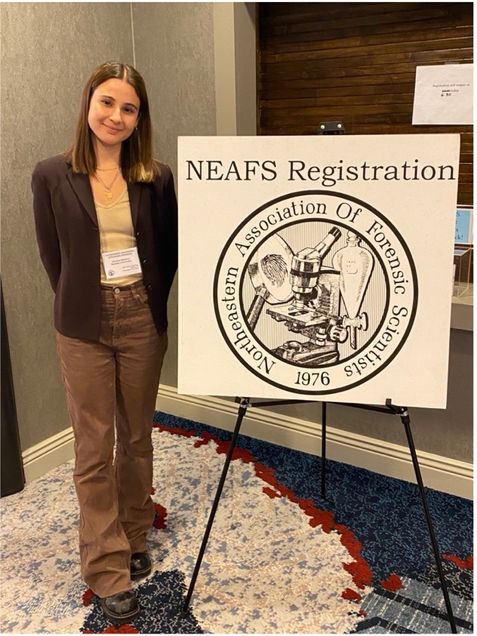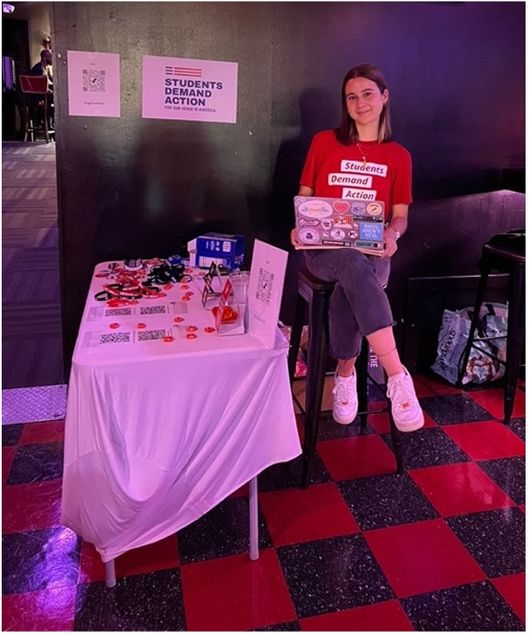GMS Student Spotlight: Maxine Slattery (BMFS ’24)

Maxine Slattery is a second-year student in the Graduate Medical Sciences (GMS) Biomedical Forensic Sciences master’s program with an eye for forensic biology, crime scene investigation and advocacy.
Slattery was born in San Diego and spent her childhood summers between Boston and Cape Cod, where her parents grew up and met.
Her older siblings moved to Boston and New York when she was a teenager. For Slattery, who already felt rooted on the East Coast, following suit felt like a natural choice. She accepted an offer at Boston University, matriculating in fall 2018 to study general biology with a minor in innovation & entrepreneurship.
Through her minor, Slattery worked on several projects with the BUild Lab IDG Capital Student Innovation Center, including a challenge to redesign the MBTA green line to be more accessible for the elderly and people who are visually impaired.
“I had always been into innovation,” Slattery said. “I had come up with a couple of products that I proposed to different companies when I was in high school. When I came to BU and found out about the Innovation Center, [I thought it would be] a good way to progress those ideas into something meaningful.”
Slattery also held a strong interest in forensic sciences since high school and had taken a fingerprint analysis lab before attending BU. These interests, combined with her background in biology, led her to investigate graduate-level forensic programs.
While she had considered applying to other master’s programs during the application cycle, her ultimate choice was clear.
“BU was always going to be the right school for me,” Slattery said.
Entering the Biomedical Forensic Sciences Master’s Program
Having spent four years on the Charles River Campus, the transition to the Medical Campus was an easy one for Slattery. Her decision to join the Biomedical Forensic Sciences Program (BMFS) was based on several factors: location, positive prospective students’ days, and elements of the program that made it stand out compared to others.
The BMFS program is the only master’s program of its kind in Massachusetts that is fully accredited by the Forensic Education Program Accreditation Commission. It is also one of the only forensic science programs in the United States based at a major medical center and one of only two forensic sciences graduate programs located in New England.
Within walking distance of the Medical Campus is the Office of the Chief Medical Examiner for Massachusetts and the Boston Police Department Crime Laboratory. Another main draw for Slattery was the program’s mock crime scene house in Holliston, Massachusetts, used for crime scene practical exams.
Slattery also credited her positive experience in the program to the faculty and advisors she has met along the way, including Associate Program Director Amy Brodeur, an assistant professor of anatomy & neurobiology.
“She is so inspiring,” Slattery said. “I didn’t know when I applied, but the other faculty members are [also] so renowned and so accomplished. It’s such an honor to learn from them.”
For her thesis, Slattery is working with Brodeur to observe and compare the differences in duration and intensity of chemiluminescence between blood and other reactive substances using luminol.
Luminol is an organic compound used as a reagent to detect non-visible blood. The compound reacts with blood – as well as other substances like bleach, some other body fluids, and rust – to form a violet glow.
The results of the study can help investigators better gauge blood detection false positives at crime scenes, helping to save on the resources and manpower necessary for sample collection and testing. Slattery said that the project is a challenging, but valuable study that combines her interests in both forensic biology and crime scene investigation.
“I have had a very enriching experience in the Biomedical Forensic Sciences program and have learned more about forensics than I [ever] could have imagined,” Slattery said. “Even though my interests are focused in forensic biology and crime scene investigation, we have to take classes in all areas of forensics – including forensic chemistry, forensic DNA analysis and forensic toxicology – making us very well-rounded as investigators.”
Advocacy in Action
Slattery’s campus involvement extends beyond academics. In 2023, she and Shana Weitzen (Pardee ’25) co-founded the BU chapter of Students Demand Action, a grassroots, youth-led organization committed to gun violence prevention across the country.
Slattery and Weitzen founded the chapter following a decision by the BU Board of Trustees to reject “a recommendation from the Advisory Committee on Socially Responsible Investing to avoid investing any University endowment funds in civilian gun manufacturers,” according to a March 2023 BU Today article.
The chapter debuted at BU’s SPLASH student involvement fair in mid-2023. Slattery, who was first involved with Students Demand Action at the national level, has also volunteered with Moms Demand Action, another organization under Everytown for Gun Safety.
“Gun violence is really a grassroots problem,” Slattery said. “It’s fueled by underlying, irresponsible gun laws that just allow guns to get into the wrong hands and people to obtain a gun without their background check being fully processed.”
As part of her work with Students Demand Action, Slattery aims to educate people about gun violence, raise mental health awareness and intervention, register people to vote, and participate in legislation-based work. She’s also had the opportunity to testify virtually in front of the Massachusetts State House.
“I am part of the lockdown generation, as we’re called,” Slattery said. “I experienced school shooting drills, and it’s just not something that a child should have to experience.”
Looking Toward the Future
With graduation only a few months away, Slattery is taking what she has learned throughout her time at BU and looking toward the future.
Her dream career would keep her in the New England – ideally in Massachusetts.
Slattery has her sights set on working as a criminalist at the Boston Police Department Crime Lab, the Massachusetts State Police Crime Lab, or another New England public crime lab. She hopes to work in crime scene investigation, both on the scene and in the lab as a forensic biologist. She also plans to continue her advocacy and educate her community about gun violence prevention.
As she progresses into the next phase of her career, she’ll take with her the memories of academic rigor, camaraderie with classmates, and making time to experience the fun of living in Boston.
For all the GMS students to come, Slattery recommends finding a similar balance between work and wellbeing.
“Find something that makes you happy, that lets you unplug from your studies and academics,” Slattery said. “Just find something that lets you disconnect and be a person as well as a student.”

